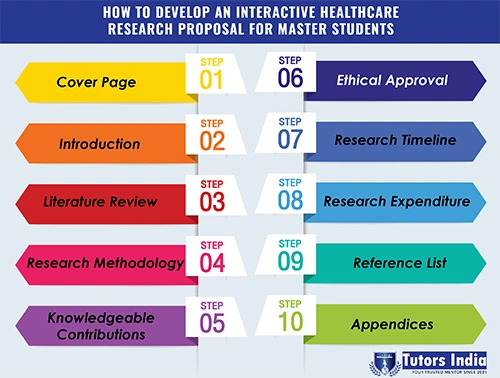How To Develop An Interactive Healthcare Research Proposal For Master Students
Introduction
The three foundations of medicine are health study, clinical training, and medical care. A wide spectrum of people may and therefore should participate in healthcare research. Even if individuals do not do independent research, people must comprehend the empirical method’s concepts in order to appreciate the significance and constraints of study and to be able to review and appraise research findings before adopting them.
Components of Research Proposal
A research proposal is a clear explanation of a project proposal that would look into a certain issue. The following are the components of a research proposal:
- Title: The title must be both informational and appealing. An excellent title piques the reader’s curiosity while also encouraging him or her to favorably consider the idea.
- Abstract: Include the major research question, the study’s justification, the hypothesis (if any), and the technique in the abstract.
- 3. Introduction: It really should explain why the investigations are necessary and how it will benefit the reader. The problem statement is an essential aspect of identifying the dissertation topic. In general, a literature review is short and to-the-point. The material that you choose should be fresh and accurate.
- Research objectives: Research objectives are the aims that will be attained as a result of the research. They might be classified as ‘generic’ or ‘specific.’ What the exploratory study will achieve in general is the research proposal. Specific goals are linked to specific research questions. They could be represented in different ways.
- Variables: Identifying the study’s primary variables, as well as their technique of measurement and quantity, is essential during the design phase.
- Hypotheses and/or questions: A hypothesis is a speculative guess or justification of a correlation between two or more factors. A research question is a statement that expresses a link between multiple variables but does so in the design of the questionnaire.
- Approach: When writing the Methods section, the reader should be able to decide if the approach is sound based on the facts provided. This part should include the following items:
Research strategy: Developing a research strategic plan is at the heart of research methodology and is likely the utmost crucial judgment a research must undertake.
Sample size: In the methodology chapter of the plan, the proposed solution should give guidance and rationale (the basis on which the sample size is computed) about sample size.
Interventions: If a therapy is used, a characterization of the drugs or devices used must be provided if they are currently legally accessible.

Other Essential Components
Ethical Issues: All sorts of health research are sensitive to moral problems. Furthermore, there is a critical issue of Conflict of Interest, which requires the investigators to provide a declaration on. It should summarize what will unfold in the period of the research in chronological sequence, with sufficient information for the issue. The research environment contains all relevant aspects of the study, such as the population to be examined (sample frame), the study location, and the study time.
Tools for research: Instruments are the tools that are used to acquire data. Citation to documented work must be mentioned for confirmed evaluation survey schedules, and the equipment should be attached to the submission.
Obtaining information: A brief overview of the data collection protocol is to be mentioned.
Data analysis: Provide the architecture of the assessment form, methods for computation and categorizing the data, and the statistical approach to be used on each data set in the presentation.
Monitoring and regulation, administration, and monitoring: Detailed summary of all practical difficulties to comply with GCP standards, protocol methods, duties of each project team member, training of study researchers, and activities taken to ensure quality control (laboratory procedures, equipment calibration etc)
The study’s importance: Describe how your research will improve, amend, or expand existing knowledge in the field of study. Tutors India has vast experience in developing dissertation topics for student’s pursuing the UK dissertation in Medical. Order Now
Diffusion of study findings: How do you plan to inform academic peers, professionals, respondents, and the research grant about the results of your studies?
Budget: A proposed budget that includes item-by-item and activity-by-activity breakdowns and justifications. Mention how the research will be paid for.
Sources: Insert credible sources on the problem at the completion of the proposal.
Appendixes: Incorporate the necessary appendices into the proposal. Protocols for interviews, a sample of informed consent forms, cover letters delivered to suitable stakeholders, and official permission letters are just a few examples.
Conclusion
In order to identify the future dissertation topics, we have reviewed the dissertation (recent peer-reviewed topics) on both Healthcare and management. Order Now. Geographic, regional, and economic inequities in healthcare provision, as well as the necessity for health-care institutions to serve increasingly varied patient groups, are national concerns. As remedies are sought, it just becomes increasingly vital to include the areas and populations most impacted by inequality. They must be encouraged and provided with the necessary skills, resources, and money to help create research-based solutions. Therefore, health care research proposals are important.
Reference
- Ng’ong’Ocholla, D. (2022). A Research Dashboard for Aligning Research Components in Research Proposals, Theses, and Dissertations in Library and Information Science. In Handbook of Research on Mixed Methods Research in Information Science (pp. 629-640). IGI Global.
- Al-Riyami, A. (2008). How to prepare a Research Proposal. Oman medical journal, 23(2), 66.
- Sudheesh, K., Duggappa, D. R., & Nethra, S. S. (2016). How to write a research proposal?. Indian Journal of Anaesthesia, 60(9), 631.
- Offredy, M., & Vickers, P. (2013). Developing a healthcare research proposal: An interactive student guide. John Wiley & Sons.

 Previous Post
Previous Post Next Post
Next Post